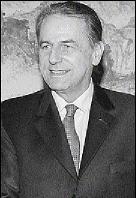IOC looks at tougher anti-doping laws
Published: Tuesday | October 6, 2009

IOC's Rogge
COPENHAGEN (AP):
Tough anti-doping laws that allow police to raid and investigate people suspected of helping athletes to use performance enhancing drugs could become a new requirement for countries hoping to host the Olympic Games.
The value of such police powers was driven home to the International Olympic Committee (IOC) by the winter Games in Turin in 2006. Italian police raided the Austrian cross-country and biathlon team lodgings and seized a large amount of doping products and equipment.
IOC medical commission chairman, Arne Ljungqvist, said the IOC's president, Jacques Rogge, has asked him to prepare a formal proposal that such laws become a requirement for bidding cities. Ljungqvist said the IOC executive can then quickly approve the requirement and it "absolutely" should be in place for cities bidding for the 2018 winter Games.
"This is something that I feel should be a prerequisite for bidding cities, that countries do have these laws in place that make it possible for public authorities and sport to work together, like we did in Italy," Ljungqvist said in an interview yesterday with the Associated Press.
"The president (Rogge) said 'I whole-heartedly support you. Please come with a note.' I will do that. I will send a formal proposal," Ljungqvist said.
Such a requirement, if adopted, could bar some countries from bidding for the Games or force them to change their laws so that police can conduct raids in investigating suspected doping offenses.
Something suspicious
Ljungqvist said that for the Turin Olympics, the IOC received intelligence "that something suspicious might be going on" with the Austrians but couldn't act on it because "we have no authority to make a raid". So it passed the information to the Italian police, "and they came back to us and said 'Yes, this looks serious and we will make a raid'."
Drug tests on the athletes came back negative but the raid netted what Ljungqvist called "a haematological laboratory, more or less, with all sorts of equipment and substances.
"This was a very significant experience," said Ljungqvist. "The whole story would have remained unknown to everyone had the Italian law not been in place and had we not shared the information between ourselves.
"It would be dramatically negative for the host country if something happens, or if suspicions happen that cannot be pursued. It would look very bad," he added. "They have to have the law in place that supports their police authorities to do it ... because this will happen again."
REUTERS



















